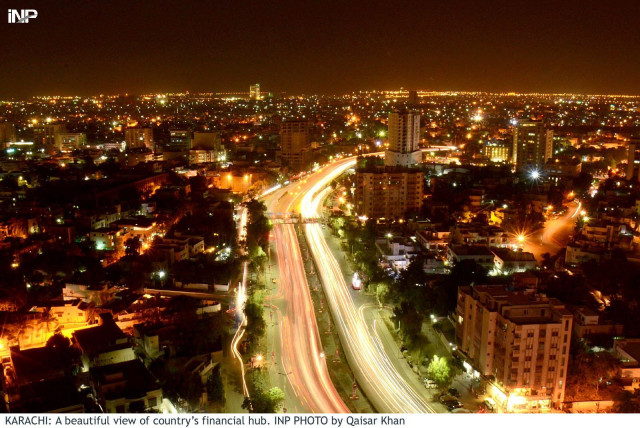Pakistani cities perform poorly in global competitiveness rankings
Poor management spoils the potential of urbanisation in <br /> the country

PHOTO: INP
Philosophy and science also emerged in cities. Ideas, commerce and trade flourished and flowed between networks of cities that developed abundance of knowledge and products for a better life everywhere.
Development is essentially an urban phenomenon. The prosperity that we enjoy – longevity, assured energy, consumer goods, variety of careers – has largely been seen in larger and denser cities. In short, prosperity, knowledge and even fulfilment come with increased urbanisation.
The urbanisation trend will accelerate this century as most of the poor countries develop and become increasingly urbanised. At the end of the century, 80% of the world population will be living in cities.
While Pakistan is now largely urbanised with estimates ranging from 50 to 70%, we can expect much more rural-to-urban migration in coming decades. Urbanisation has indeed boosted growth. However, poor city management and regulation has largely wasted the potential of urbanisation.
Pakistani cities remain badly configured on international yardsticks. Cities are competitive for investment and growth if they prioritise commerce, community, creativity and density. Such cities favour high-rise, mixed use, walkability and diversity. To make these things happen, these put people before cars by making the use of cars within denser city limits expensive.
Agriculture Sector: Experts call for improved value chains
City rankings
On the numerous international rakings, Pakistani cities perform poorly in terms of the criteria of density, livability, business environment, walkability and competitiveness.
The Economist ranking of Hot Spots by 2025 ranked 120 cities in terms of competitiveness prospects in 2025. Competitiveness was seen as the “ability to attract capital, business, talent and visitors”.
Karachi was ranked 111th while Singapore was 3rd, Hong Kong 4th, Seoul 15th, Dubai 23rd, Kuala Lumpur 31st, Shanghai 38th, Mumbai 51st, Delhi 56th and Bangkok 66th. Other Pakistani cities such as Lahore did not even make it to the list of 120 cities.
History and research confirms that cities are the engines of growth and development. Competitive cities – which provide inclusive opportunities for social and economic mobility of individuals, groups and communities – attract talent and capital by providing them with a crucible for idea, knowledge and product development.
Cities that do not configure themselves for releasing this creative potential will see an increase in crime, disease, inequality and deprivation.
Why do all our leaders of society – political, bureaucratic and the wealthy – fail to understand the importance of competitive cities? There is hardly any conversation on the economic potential of cities. Nor is there any realisation of how cities compete for global talent, capital and resources.
All political party manifestos for the 2013 general election were silent on this important subject. Even federal and provincial economic reports are unaware of this important fact.
ICCI for better security arrangements of markets
New realities
With election coming up, it is important for political parties to wake up to the new realities of Pakistan. Studies have shown that Pakistan’s urban population is somewhere around 60-70%.
Urban population is generally more aware of rights and needs. It will be more exacting in coming elections and look to manifestoes addressing their needs. It is quite likely that urban issues will be important in the ballot.
Currently, politicians seem to think that main issues are only education and health while mainly focusing on development through mega projects, largely roads and bus systems. Focusing on these areas in isolation of cities has led to the development of large dysfunctional urban agglomerations in Pakistan.
For developing more competitive cities, the political parties should consider the following:
Decentralisation based on autonomous cities will be important for each city in order to find its creative edge. Only autonomous cities can meet the challenges of urban and social service provision.
However, there can be no decentralisation if local governments remain hierarchically subservient to federal and provincial governments. Cities must, therefore, have their own professional, technical and administrative staff independent of the federal and provincial bureaucracies.
With population and development pressures, it is now essential to allow vertical growth of cities to pave the way for the provision of affordable housing, creative commerce, public space and many other city functions.
The sprawling model that housing societies have engendered so far is wasteful, destroying our cities and making them uncompetitive.
Thankfully, public transport has become important in the public discourse, but sadly our leadership is interpreting it only as an expensive bus system for urban sprawl. There are cheaper and healthier alternatives available such as biking and walking, especially with vertical growth, as density increases.
The adoption of these proposals can spark a huge sustained growth in the country. The competitiveness of cities is the way forward for Pakistan. It is time politics move towards suggested policies and away from mega projects.
Nadeemul Haque was the deputy chairman of the Planning Commission from 2010-13 and Naveed Iftikhar is a public policy adviser and researcher
Published in The Express Tribune, December 4th, 2017.
Like Business on Facebook, follow @TribuneBiz on Twitter to stay informed and join in the conversation.


















COMMENTS
Comments are moderated and generally will be posted if they are on-topic and not abusive.
For more information, please see our Comments FAQ